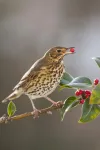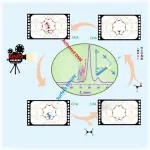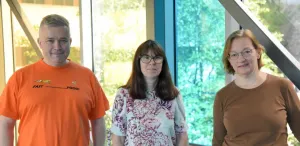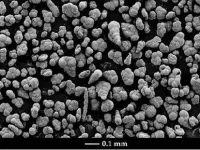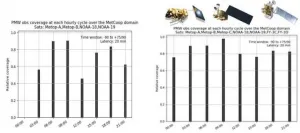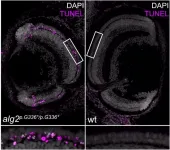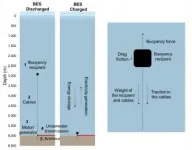Changes in physician work Hours, patterns during COVID-19
JAMA Network Open
2021-06-23
(Press-News.org) What The Study Did: The hours worked and patterns of work activities among U.S. physicians before and during the COVID-19 pandemic were examined in this study.
Authors: Xiaochu Hu, Ph.D., of the Association of American Medical Colleges in Washington, D.C., is the corresponding author.
To access the embargoed study: Visit our For The Media website at this link https://media.jamanetwork.com/
(doi:10.1001/jamanetworkopen.2021.14386)
Editor's Note: Please see the article for additional information, including other authors, author contributions and affiliations, conflict of interest and financial disclosures, and funding and support.
INFORMATION:
Media advisory: The full study is linked to this news release.
Embed this link to provide your readers free access to the full-text article This link will be live at the embargo time http://jamanetwork.com/journals/jamanetworkopen/fullarticle/10.1001/jamanetworkopen.2021.14386?utm_source=For_The_Media&utm_medium=referral&utm_campaign=ftm_links&utm_term=062321
About JAMA Network Open:
JAMA Network Open is the new online-only open access general medical journal from the JAMA Network. On weekdays, the journal publishes peer-reviewed clinical research and commentary in more than 40 medical and health subject areas. Every article is free online from the day of publication.
ELSE PRESS RELEASES FROM THIS DATE:
2021-06-23
What The Study Did: Researchers examined family voucher-based kidney donations and the capability of voucher redemption to provide timely kidney transplants.
Authors: Jeffrey L. Veale, M.D., of the University of California, Los Angeles, is the corresponding author.
To access the embargoed study: Visit our For The Media website at this link https://media.jamanetwork.com/
(doi:10.1001/jamasurg.2021.2375)
Editor's Note: The article includes conflict of interest disclosures. Please see the article for additional information, including other authors, author contributions and affiliations, conflict of interest and ...
2021-06-23
Migratory birds carry most seeds in the wrong direction to help plants cope with climate change, new research shows.
The study, published in Nature, reveals that the vast majority of plants from European woodlands are dispersed by birds migrating to warmer latitudes in the south, while far fewer are dispersed by birds migrating north.
As a consequence of global warming, the optimal climatic conditions of species are moving towards cooler latitudes, forcing the redistribution of life on Earth.
Mobility allows many animals to reach new areas with a suitable climate.
However, movement of plant species depends on the dispersal of their seeds at long ...
2021-06-23
CHAPEL HILL, NC--Researchers at the University of North Carolina at Chapel Hill and the UNC Lineberger Comprehensive Cancer Center have uncovered a new mechanism that activates specific genes, leading to the development of cancers.
They showed that a mutation that fuses two unrelated genes can promote a process similar to that observed when oil and water are mixed but do not blend together. The process, called liquid-liquid phase separation, occurs inside a cell's nucleus and enables the formation of compartments with various physical properties that can promote cancers such as acute leukemias. Their findings will be published online June 23, 2021, in Nature.
"Phase separation and its role in cancer has been a missing puzzle piece in understanding this disease," said UNC Lineberger's ...
2021-06-23
A joint research team led by Prof. LIU Zhongmin, Prof. WEI Yingxu, and Prof. XU Shutao from the Dalian Institute of Chemical Physics (DICP) of the Chinese Academy of Sciences (CAS) revealed the mechanism underlying the formation of the first carbon-carbon (C-C) bond formation during the methanol-to-olefins (MTO) process.
This study was published in Chem on June 23.
Prof. ZHENG Anmin's group from Innovation Academy for Precision Measurement Science and Technology of CAS was also involved in the study.
The first C-C bond in the MTO process is formed at the initial stage of the reaction. There is no direct method to elucidate the bond formation /reaction mechanism due to the difficulty in capturing intermediate species.
"We investigated the ...
2021-06-23
A paper published in the prestigious journal Nature Medicine on long-COVID, describes persistent symptoms six months after acute COVID-19, even in young home isolated people.
The study from the Bergen COVID-19 Research Group followed infected patients during the first pandemic wave in Bergen Norway.
"The main novel finding is that more than fifty per cent of young adults up to 30 years old, isolated at home, still have persistent symptoms six months after mild to moderate disease", the leader of the group, Professor Nina Langeland explains.
The most common symptoms were loss of smell and/or taste, fatigue, ...
2021-06-23
Pioneering research has shown marine ecosystems can start working again, providing important functions for humans, after being wiped out much sooner than their return to peak biodiversity.
The study, led by the University of Bristol and published today in Proceedings of the Royal Society B, paves the way for greater understanding of the impact of climate change on all life forms.
The international research team found plankton were able to recover and resume their core function of regulating carbon dioxide levels in the atmosphere more than twice as fast as they regained full levels of biodiversity.
Senior author Daniela Schmidt, Professor ...
2021-06-23
An accurate, non-invasive, and low-cost method of testing for COVID-19 using samples taken from the screens of mobile phones has been developed by a team led by UCL researchers at Diagnosis Biotech.
The study, published in eLife and led by Dr Rodrigo Young (UCL Institute of Ophthalmology), analysed swabs from smartphone screens rather than directly from people, and found that people who tested positive by the regular nasal swabbing PCRs were also positive when samples were taken from phone screens.
The new method - known as Phone Screen Testing (PoST) - detected the COVID-19 virus on the phones of 81 to 100% of contagious people with a high viral load, suggesting it is as accurate as antigen lateral flow tests.
Globally active screening for COVID-19 is still a priority ...
2021-06-23
Modern weather forecasts rely heavily on data retrieved from numerical weather prediction models. These models continue to improve and have advanced considerably throughout more than half a century. However, forecast reliability depends on the quality and accuracy of initialization data, or a sample of the current global atmosphere when the model run is started. This process of bringing surface observations, radiosonde data, and satellite imagery together to create a picture of the initial atmospheric state is called data assimilation. Satellite upgrades have significantly improved this process, providing more data than ever before. Several recent studies show ...
2021-06-23
A rare genetic defect that affects the so-called ALG2 gene can cause serious metabolic diseases in humans. It does so through the defective formation of proteins and sugar molecules. Until now, its rareness and complexity made it difficult to study this congenital glycosylation disorder. A research team led by Prof. Dr Joachim Wittbrodt and Dr Thomas Thumberger from the Centre for Organismal Studies (COS) of Heidelberg University has finally succeeded in introducing the underlying mutation in the ALG2 gene in a fish model, thus allowing the causes of these complex diseases to be studied at the molecular level.
Human cells are kept alive by the activity of millions of proteins. As they mature, these proteins ...
2021-06-23
What do pipes and anchors have to do with storing energy? More than you might think! A new IIASA-led study explored the potential of a lesser known, but promising sustainable energy storage system called Buoyancy Energy Storage.
There is general consensus that renewable energy sources will play an important role in ensuring a healthier and more sustainable future for the planet and its people, and many countries are indeed already seeing such technologies displacing "dirty" fossil fuels in the power sector in an effort to lower emissions. The biggest problem with renewable energy sources, however, is that power supply is intermittent, meaning that the energy output at any given time does not necessarily meet the demand at that time. ...
LAST 30 PRESS RELEASES:
[Press-News.org] Changes in physician work Hours, patterns during COVID-19
JAMA Network Open
